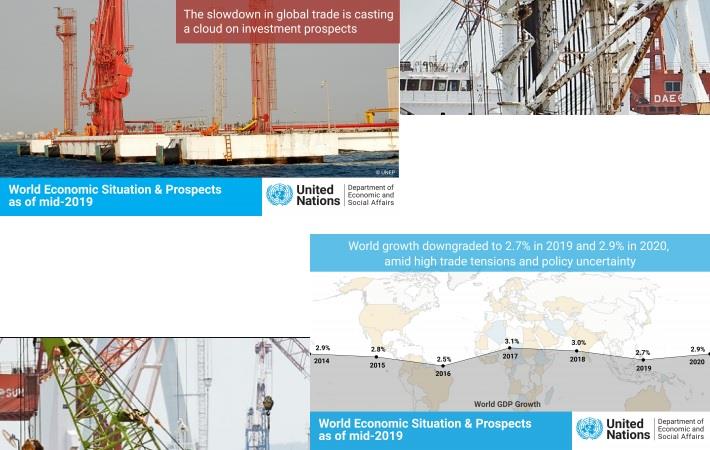
Weaker economic growth puts at risk essential investments in areas such as education, health, climate change adaptation and sustainable infrastructure, says the report.
The growth outlook in all major developed economies and most developing regions has weakened due to a confluence of both domestic and external factors. Following an expansion of 3.0 per cent in 2018, world gross product growth is now projected to moderate to 2.7 per cent in 2019 and 2.9 per cent in 2020, reflecting a downward revision from the forecasts released in January.
The report identifies several downside risks that could trigger a sharper or more prolonged growth slowdown in the world economy, potentially inflicting significant damage on development progress. These risks include a further escalation in trade tensions, a sudden deterioration in financial conditions, and the accelerating effects of climate change.
“More comprehensive and well-targeted policy responses are needed to tackle the current growth slowdown,” says Elliot Harris, UN chief economist and assistant secretary-general for Economic Development. “It is increasingly clear that policies to promote sustainable development will need to look beyond GDP growth and identify new and more robust measures of economic performance that appropriately reflect the costs of inequality, insecurity and climate change.”
Downwardly revising the projected growth of world trade to 3.4 per cent in 2018 to 2.7 per cent in 2019, the report warns that a spiral of additional tariffs and retaliations could have significant spillovers on the developing countries, particularly those with a high export exposure to the impacted economies. A more protracted period of weak international trade activity could also harm investment prospects and adversely affect productivity growth in the medium term.
In response to slowing growth and subdued inflation, major central banks have eased their monetary policy stances, the report mentions. These recent monetary policy shifts have helped to stabilise global financial markets and capital flows to emerging economies. However, the report cautions that the more protracted period of monetary accommodation could exacerbate financial imbalances, including further fuelling debt accumulation, raising medium-term risks to financial stability.
Noting that the increase in frequency and intensity of natural disasters highlight the rising threats from climate change, the report calls for a stronger and more coordinated multilateral approach to global climate policy, which includes the use of carbon pricing mechanisms. A price on carbon compels economic decision-makers to internalise some of the environmental costs of their consumption and production. The report documents an increasing use of internal CO2 prices by the private sector. This not only results in higher energy efficiency and cost savings, but also leaves firms better prepared for expected policy changes. (RKS)
ALCHEMPro News Desk – India
Receive daily prices and market insights straight to your inbox. Subscribe to AlchemPro Weekly!